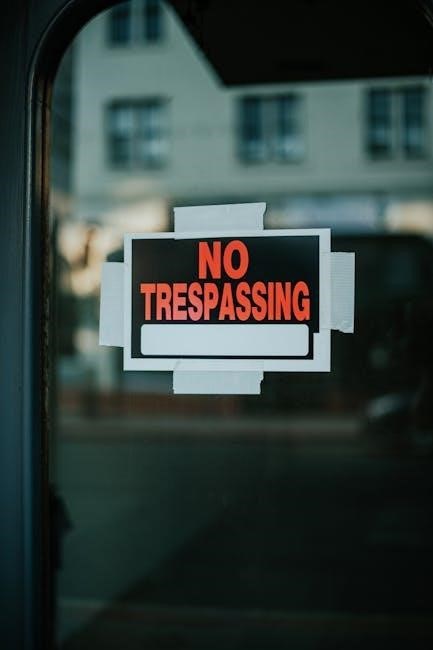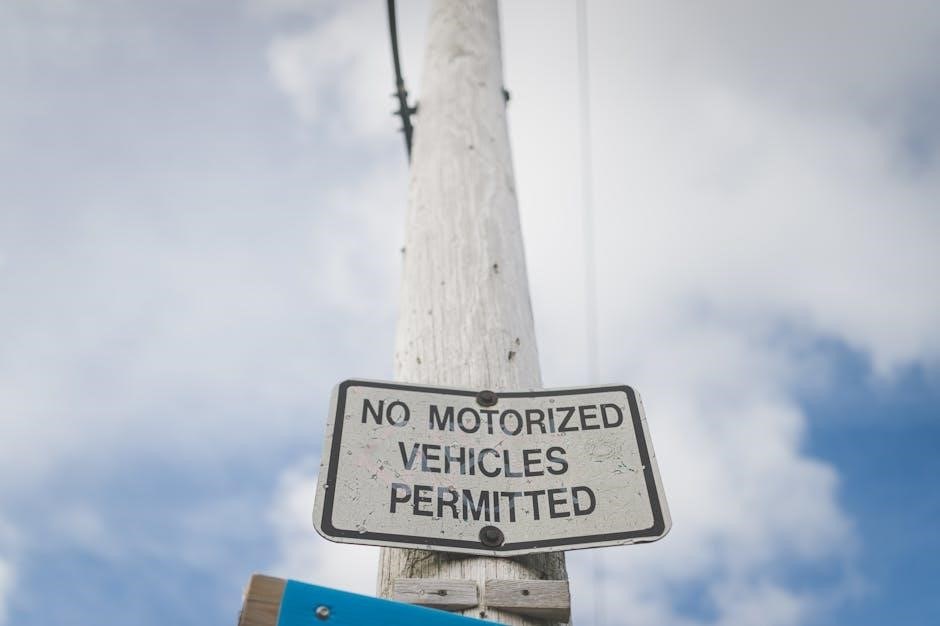Pennsylvania private club rules and regulations are governed by state laws, PLCB regulations, and internal bylaws. These rules ensure legal compliance, proper governance, and member conduct standards, maintaining order and accountability within private clubs.
1.1. Overview of Private Clubs in Pennsylvania
Private clubs in Pennsylvania are organizations licensed to serve liquor, operating under specific rules. They include social, fraternal, and athletic clubs, governed by PLCB regulations, internal bylaws, and state laws. These clubs must maintain non-profit status, adhere to membership criteria, and comply with licensing requirements to ensure lawful operation and member benefits.
1.2. Importance of Understanding Rules and Regulations
Understanding Pennsylvania private club rules is crucial for legal compliance, avoiding penalties, and maintaining operational integrity. Clubs must adhere to PLCB regulations, state laws, and internal bylaws to prevent fines, license revocation, and legal disputes. Compliance ensures smooth operations, member safety, and maintaining a reputable standing within the community and regulatory authorities.

Legal Framework Governing Private Clubs in Pennsylvania
Pennsylvania’s legal framework for private clubs is governed by PLCB regulations, state laws, and internal bylaws, ensuring compliance with licensing, operational standards, and accountability measures.
2.1. Pennsylvania Liquor Control Board (PLCB) Regulations
The Pennsylvania Liquor Control Board (PLCB) regulates private clubs through specific licensing requirements and operational standards. Clubs must adhere to PLCB rules, including maintaining proper records, displaying licenses, and following guidelines for events and alcohol service. Section 5.81 of PLCB regulations mandates compliance with state laws and internal bylaws, ensuring accountability and legal adherence in all club operations.
2.2. Compliance with State Laws and Local Ordinances
Private clubs in Pennsylvania must comply with state laws and local ordinances, ensuring adherence to governance, membership, and operational standards. Clubs are required to maintain proper records, follow licensing rules, and abide by regulations on events and activities. Non-compliance can lead to penalties, emphasizing the importance of strict adherence to both state and local legal requirements.

Membership Requirements and Restrictions
Membership in Pennsylvania private clubs requires meeting specific eligibility criteria, following application procedures, and adhering to rules set by the club’s constitution and bylaws, ensuring compliance with state laws.
3.1. Eligibility Criteria for Membership
Membership eligibility in Pennsylvania private clubs typically requires applicants to meet specific criteria, such as being of legal age, demonstrating good character, and completing a formal application process. Clubs must adhere to non-discriminatory practices and comply with PLCB regulations. Additionally, clubs often require applicants to be sponsored by existing members and undergo a vetting process to ensure alignment with club values and bylaws.
3.2. Application and Admission Processes
The application and admission processes for Pennsylvania private clubs involve submitting a formal application, often requiring sponsorship by existing members. Applicants must provide personal information and undergo a review process. Clubs may conduct interviews or background checks. Admission typically requires approval by the membership committee or a vote by the club’s governing body, ensuring compliance with bylaws and regulations.
Governance and Operational Standards
Pennsylvania private clubs operate under constitutions and bylaws, ensuring governance clarity. Club officers oversee compliance with PLCB regulations, maintaining operational standards and proper record-keeping practices.
4.1. Role of Constitutions and Bylaws
Constitutions and bylaws are foundational documents governing Pennsylvania private clubs. They outline governance structures, membership processes, and operational rules, ensuring compliance with PLCB regulations. These documents provide clarity on decision-making authority, financial management, and dispute resolution, maintaining order and accountability within the club. They also guide member conduct and ensure adherence to state laws and internal policies.
4.2. Record-Keeping and Reporting Obligations
Pennsylvania private clubs must maintain accurate records, including membership details, financial transactions, and event logs. Regular reporting to the PLCB is required to ensure compliance with regulations. Clubs must also retain documentation of meetings, elections, and policy updates. These records are essential for audits, inspections, and demonstrating adherence to state laws and internal governance standards.

Events, Tournaments, and Activities
Pennsylvania private clubs must adhere to PLCB regulations when hosting events, tournaments, and activities. These include rules prohibiting unlawful gambling and ensuring compliance with state laws and club bylaws.
5.1. Rules for Hosting Events and Tournaments
Pennsylvania private clubs must comply with PLCB regulations and state laws when hosting events and tournaments. Events must not involve unlawful gambling, and all activities must align with the club’s bylaws. Clubs are required to obtain necessary permits, maintain proper documentation, and ensure compliance with legal standards to avoid penalties. Record-keeping is essential to verify adherence to these rules and regulations.
5.2. Gambling and Gaming Regulations
Private clubs in Pennsylvania must adhere to strict gambling and gaming regulations. Authorized activities include Pennsylvania Lottery transactions and legally sanctioned bingo or small games of chance. Clubs must comply with PLCB rules and maintain proper documentation to avoid penalties. Bylaws play a crucial role in governing these activities, ensuring all operations remain lawful and within state guidelines.
Penalties for Non-Compliance
Non-compliance with Pennsylvania private club rules and PLCB regulations can result in fines, license revocation, or legal action. Clubs must adhere to state laws to avoid penalties.
6.1. Consequences of Violating PLCB Regulations
Violating PLCB regulations can lead to severe penalties, including hefty fines, suspension, or revocation of liquor licenses. Clubs may face legal action and reputational damage. Compliance is crucial to avoid these consequences.
6.2. Fines and License Revocation Procedures
Fines for non-compliance with PLCB regulations can range from hundreds to thousands of dollars. Repeat violations may lead to license revocation. Procedures involve formal hearings, allowing clubs to appeal or correct issues. Revocation is a last resort, typically after multiple offenses or severe violations, ensuring fair enforcement of state liquor laws and regulations.
Smoking Regulations in Private Clubs
Pennsylvania private clubs must adhere to state smoking laws, establishing and enforcing smoking policies as per their bylaws and PLCB regulations to avoid penalties.
7.1. Smoking Policies and Restrictions
Pennsylvania private clubs must comply with state smoking laws, prohibiting smoking in enclosed public spaces. Clubs may designate outdoor smoking areas but must ensure proper ventilation. Smoking policies must be clearly outlined in club bylaws, with signs posted to inform members and guests. Enforcement of these restrictions is essential to avoid penalties and maintain compliance with public health regulations.
7.2. Enforcement of Smoking Laws
Enforcement of smoking laws in Pennsylvania private clubs is monitored by the PLCB and local health authorities. Clubs must maintain compliance records and display “No Smoking” signs. Regular inspections ensure adherence to regulations. Non-compliance may result in fines or license revocation. Clubs are also required to train staff on enforcing smoking policies, ensuring a safe environment for all members and guests.
Amending Club Rules and Regulations
Amending Pennsylvania private club rules requires a formal process, including member voting and approval. Changes must comply with PLCB regulations and be documented for record-keeping purposes.
8.1. Process for Updating Bylaws and Constitutions
Updating bylaws and constitutions requires a structured approach. Clubs must notify members, hold a meeting, and obtain majority approval. Changes must align with PLCB regulations and state laws. Documentation is essential for compliance. The process ensures transparency and maintains club integrity, adhering to legal standards and member agreements while preserving organizational stability and operational continuity. Proper record-keeping is mandatory.
8.2. Member Voting and Approval Requirements
Member voting is crucial for approving updates to bylaws and constitutions. Clubs must notify members in advance, ensuring a quorum is met. A majority vote is typically required, with records of the decision maintained. This process ensures democratic governance and compliance with legal standards, fostering transparency and accountability within the club’s operational framework. Proper documentation is essential for verifying the legitimacy of changes.

Enforcement Mechanisms
Enforcement involves active monitoring and adherence to PLCB regulations, ensuring clubs operate within legal frameworks. Regular audits, inspections, and penalties for non-compliance maintain accountability and uphold standards effectively.
9.1. Role of Club Officers and Management
Club officers and management are responsible for enforcing rules, ensuring compliance with PLCB regulations, and maintaining order. They oversee daily operations, manage member conduct, and implement policies to uphold the club’s standards and legal obligations, ensuring a safe and regulated environment for all members and guests to enjoy responsibly.
9.2. Inspection and Compliance Checks
Regular inspections ensure Pennsylvania private clubs adhere to state laws and PLCB regulations. These checks verify proper record-keeping, facility safety, and compliance with licensing requirements. Inspections are conducted by authorized officials to maintain legal standards and protect public interest, ensuring clubs operate responsibly and uphold their obligations under the law and internal governance policies.
Member Discipline and Dispute Resolution
Pennsylvania private clubs have clear procedures for addressing member misconduct and resolving disputes transparently, ensuring adherence to bylaws and state laws for fair governance.
10.1. Procedures for Addressing Misconduct
Pennsylvania private clubs must follow established procedures to address member misconduct, ensuring fairness and transparency. These procedures, outlined in club bylaws, include documentation of incidents, investigative steps, and disciplinary actions such as suspension or expulsion. Clubs must maintain detailed records of all proceedings, adhering to PLCB regulations and state laws to ensure compliance and accountability in resolving misconduct cases effectively.
10.2. Mediation and Arbitration Processes
Mediation and arbitration are essential for resolving internal disputes within Pennsylvania private clubs. These processes, often outlined in club bylaws, involve neutral third parties to facilitate fair resolutions; Mediation encourages dialogue to reach mutual agreements, while arbitration provides binding decisions. Both methods ensure confidentiality and efficiency, aligning with state laws and PLCB regulations to maintain harmony and order within the club environment effectively.
Accessing PA Private Club Rules and Regulations
Pennsylvania private club rules and regulations can be accessed through official PLCB websites, downloadable PDFs, and designated online platforms for public review and compliance.
11.1. Official Documentation and Resources
The Pennsylvania Liquor Control Board (PLCB) provides official documentation, including downloadable PDFs, detailing private club rules, regulations, and compliance requirements. These resources are accessible on the PLCB’s website and include guides on licensing, operational standards, and legal obligations. Members and club management can refer to these documents to ensure adherence to state laws and internal bylaws.
11.2. Online Platforms for Rule Access
Official Pennsylvania private club rules and regulations can be accessed through the Pennsylvania Liquor Control Board (PLCB) website. The PLCB provides downloadable PDF guides, including sections like 5.81, which outline specific requirements for private clubs. Additionally, the Pennsylvania State Legislature’s website offers access to relevant statutes. Third-party legal databases also host these documents, ensuring easy access for members and club management.